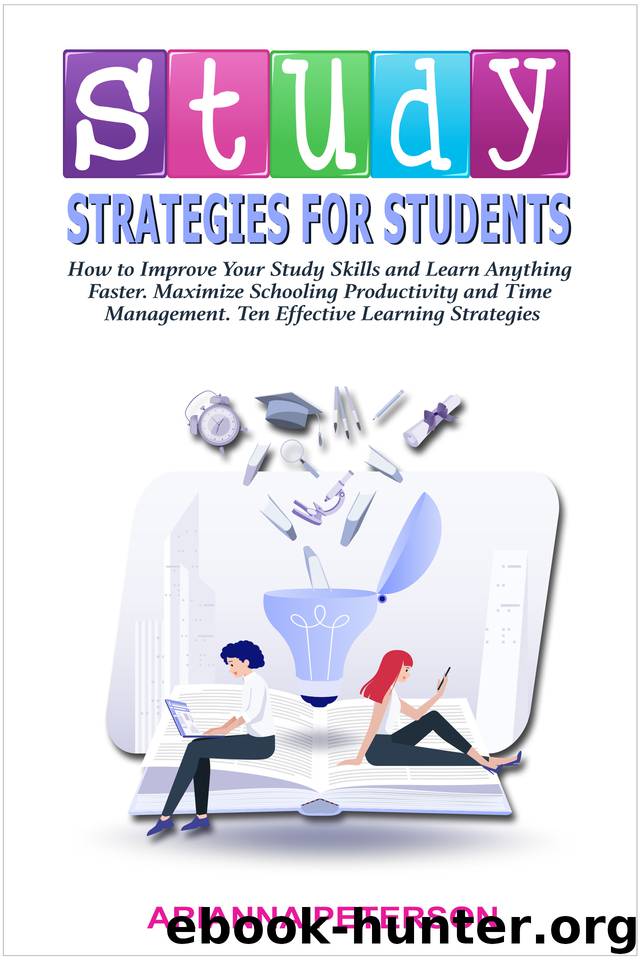Study Strategies for Students: How to Improve Your Study Skills and Learn Anything Faster, Maximize Schooling Productivity and Time Management, Ten Effective ... (Accelerated Learn by Peterson Arianna

Author:Peterson, Arianna [Peterson, Arianna]
Language: eng
Format: epub
Published: 2020-01-12T16:00:00+00:00
Focus on Time Management and Organization
When a student can create, divide, and allocate time, we say that he is managing his time well. It is critical to find ways of motivating one's mind and stimulating thoughts when working for an extended period. The tips below help to show different ways that a student can keep his mind fresh and active while studying. The student should begin a study session by making sure that the task is achievable within the time set. A study task that has a heavy load and is involving should you can split it into smaller possible tasks. Splitting helps the students gain confidence and improve motivation as they tackle the smaller attainable goals .
Another strategy is introducing variety into one's study work to avoid doing the same thing for an extended number of hours. Otherwise, the brain will soon tire and cease being productive. Long periods of study activity should be broken down into shorter periods and consistently reviewed against the set objectives. The student should make the most of natural breaks at the end of every chapter or two.
Being active in trying to overcome obstacles that hinder effective time management is also advisable. These hindrances include but are not limited to poor concentration, lack of motivation, and a noisy study environment. The idea is to try and ignore the less exciting tasks and tackling them before moving on to more stimulating work.
In short, organizing one’s time is a personal journey that requires the student to find a
way of monitoring and planning activities that suits them. Where written lists are preferred, then you can use the records. If work from plans and diagrams are more preferred, then those should be used instead. The idea is to continually reflect upon one's approach to planning by being clear about the task to be accomplished, using a term planner to gauge productivity, and a weekly planner to set clear agenda for the days or weeks ahead .
Time management can be defined as a process of planning and exercising control of how much time one takes on specific activities. It involves juggling studies, family, social life, personal interests, and commitments. Whether a student realizes it or not, they are always making time management decisions. They may decide when to sleep, go to class, study, go to the library, or go to the gym. Moreover, these decisions play a role in your time management strategies. The following are the rules students can adopt around effective time management.
According to recommendations, a student should get enough sleep, which is at least seven to eight hours a night. The student should schedule at least twenty hours a week to study. Every week should contain at least four different study activities. For each day, plan up-to a maximum of ten hours of school work with each subject taking a maximum of five hours a day. Allow time for breaks, occasionally planning a whole day without any school work. Keep in mind that an overflowing schedule is discouraging and inefficient.
Download
This site does not store any files on its server. We only index and link to content provided by other sites. Please contact the content providers to delete copyright contents if any and email us, we'll remove relevant links or contents immediately.
| ASVAB | GED |
| GRE | NCLEX |
| PRAXIS | SAT |
| See more | Flash Cards |
| Study Guides | Study Skills |
| Workbooks |
Talking to Strangers by Malcolm Gladwell(13349)
The Compound Effect by Darren Hardy(8949)
Tools of Titans by Timothy Ferriss(8368)
Wonder by R. J. Palacio(8098)
The Lover by Duras Marguerite(7893)
A Court of Wings and Ruin by Sarah J. Maas(7821)
The Circle by Dave Eggers(7105)
Deep Work by Cal Newport(7066)
Kaplan MCAT General Chemistry Review by Kaplan(6928)
To All the Boys I've Loved Before by Jenny Han(5842)
Wiseguy by Nicholas Pileggi(5770)
The Body: A Guide for Occupants by Bill Bryson(5082)
Eat That Frog! by Brian Tracy(4526)
1,001 ASVAB Practice Questions For Dummies by Powers Rod(4500)
Cracking the GRE Premium Edition with 6 Practice Tests, 2015 (Graduate School Test Preparation) by Princeton Review(4284)
Pre-Suasion: A Revolutionary Way to Influence and Persuade by Robert Cialdini(4224)
Barron's AP Biology by Goldberg M.S. Deborah T(4147)
ACT Math For Dummies by Zegarelli Mark(4043)
Alive: The Story of the Andes Survivors by Piers Paul Read(4020)
